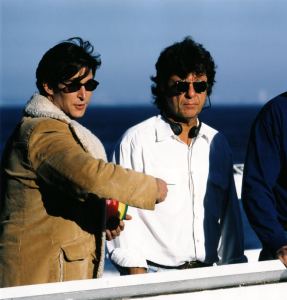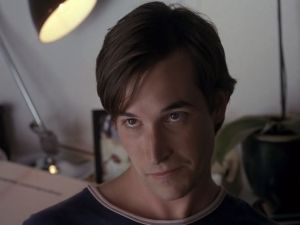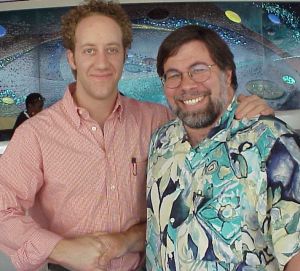Christian Bale might seem like the perfect actor to play Steve Jobs. Like the Apple founder, Bale is a perfectionist who cares so deeply about his craft that he can come across like a raging lunatic.
Bale, who will star in Danny Boyle’s upcoming biopic about Jobs, might be the best hope yet for a riveting onscreen representation of Apple’s late leader. But for many Apple fans, a 1999 TV movie remains the definitive depiction of Jobs.
That movie is Pirates of Silicon Valley, which tells the story of Apple versus Microsoft during a 20-year stretch starting in the late-1970s. With Pirates of Silicon Valley turning 15 this year, Cult of Mac spoke with its director, Martyn Burke, about Noah Wyle (who plays Jobs in the film), threatened lawsuits, and the miraculous way Jobs spun a potentially disastrous bit of PR into good press.

“It seems like the film’s reputation is growing over time,” Burke says. “It’s been broadcast in South America, Russia, everywhere you can think of. At the time it came out, it was pretty successful, but to be talking about it after all these years is great.”
Intriguingly, Burke says he had no interest when he was first offered the project in the late 1990s. Based on a book called Fire in the Valley, by writers Paul Freiberger and Michael Swaine, he felt no connection to the story at all.
“It was all about how the ‘286 computer’ became the ‘386’ and so on,” he says. “I was bored by it.”
It was only when the studio asked Burke what he would like to do with the script that he began considering what a fascinating dramatic story he actually had to work with.
“I’m a great believer in Shakespeare, and what we had was a modern equivalent of Hamlet, featuring two young princes, Bill Gates and Steve Jobs,” he says. “The more I read about Steve in particular, the more I saw him in those Shakespearean terms. He was brilliant, volcanic, obsessive, suspicious, even vicious in a business sense. He was about conquest, always conquest. I said, ‘That’s the sort of movie I want to make.’”
Burke reworked the screenplay himself and signed on to direct. As he looked into the facts behind the story, he found that it dealt with a subject that most definitely was of interest to him: the California counterculture of the 1960s.
“Steve Jobs was a descendant of this techno-counterculture,” he says. “There was this messianic quality that came out of San Francisco in the ’60s. It was about Berkeley, the Free Speech movement and flower power. What he was doing was part technological, and part insurrectionist.”
The original plan was to shoot the film in Toronto. Around $1 million worth of sets had been built, representing a significant portion of the film’s $15 million budget. At the last moment, the producers of ER, who at the time employed star Noah Wyle, decided that they weren’t going to release the actor for the amount of time needed. “We had to shut the whole production down,” Burke says. “It was a huge body blow. For a while it looked as if we were dead.”

The crew headed back to Los Angeles where, miraculously, the production was able to start up again. That wasn’t the end of the stress, however.
On the first day of shooting proper, a copy of Fortune was delivered to the set. An article in the magazine claimed that both Microsoft and Apple were planning to get an injunction to shut down filming. Fortunately, nothing came of this.
“Time-Warner had a big legal department and they came down on me like a ton of bricks before we started filming,” Burke says. “They picked apart every single line of the script. I felt like I was on trial. But it clearly worked, because we didn’t hear from anybody.”
If tensions were running high off the set, a similar atmosphere dogged the Pirates of Silicon Valley cast and crew, who broke down into Mac and PC factions, arguing about the merits of each platform throughout filming.
Who did Burke side with?
“I was a PC guy going in, and coming out I was 100 percent a Mac guy,” he laughs. “Fifteen years later, nothing’s changed.”
As good as Burke’s direction and screenplay is, however, much of the credit for Pirates of Silicon Valley must lie with Wyle. A bad film can be redeemed by a tremendous acting performance, and a good one can be made. From his appearance to his voice to his mannerisms, everything about Wyle’s performance perfectly evokes Apple’s co-founder.
“Whatever was in the air, he just absorbed it,” Burke says. “He became Jobs. It was a remarkable transformation. We had a photo of Steve Jobs at about 28 years old, from the cover of Fortune magazine. We did a mockup with Noah and it was almost impossible to tell them apart.”

Wyle is the standout, but there are other great performances in the film, including The Breakfast Club’s Anthony Michael Hall as a creepily intense Bill Gates and Joey Slotnick as Steve Wozniak. The real Woz was reportedly so taken by his movie counterpart that he flew to Los Angeles solely to eat lunch with the actor at the airport.
“Steve Wozniak made several speeches in which he said that the film accurately portrays how things actually happened,” Burke says. “To me that was better than any awards or nominations the film could get.”
Internally, Apple might have been less than pleased at aspects of the portrayal, but the company (and Jobs in particular) handled it brilliantly. Shortly after the film came out, Jobs flew Wyle to New York in secret, where the actor appeared onstage at a Macworld event, coming out at the beginning to impersonate Jobs.
“What a move,” Burke says. “Steve Jobs took what could have been a firestorm of criticism against Apple, because of the way he was portrayed in the film, and turned it into a positive. Instantly Apple turned all of the publicity in its favor.”
One person Jobs never wanted to speak to was Burke, however.
“Steve wanted nothing to do with me,” the director says. “A few years later one of my friends asked me to call Apple to see if I could get Steve Jobs interested in a project involving J.K. Rowling. I was somehow designated as the person who should call Steve, because I had made Pirates of Silicon Valley. I said, ‘I guarantee he will never speak to me.’”
Nonetheless, Burke was put through to Jobs’ office and talked to his personal assistant. “As soon as she found out who I was, there was a distinct chill in the air. I immediately called my friend back and said, ‘You’ll never hear from him.’ And they never did.”
Pirates of Silicon Valley isn’t available in the U.S. iTunes Store, although you can pick it up in the U.K. store for £10 ($16.17) at this link.


